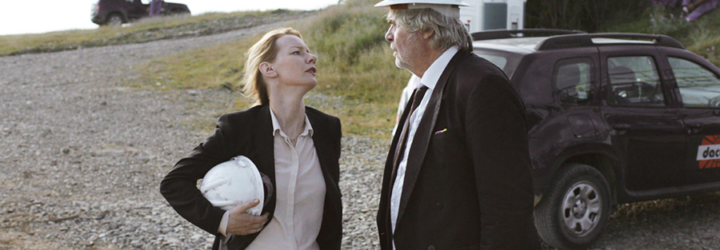Germany’s entry for Best Foreign Language Film at this year’s Oscars is not the heavy historical drama North American audiences have come to expect. A hit with critics and festival audiences at Cannes, and winner of the Fipresci Grand Prix, Maren Ade’s Toni Erdmann does not look back on Germany’s difficult past. Instead, it offers a contemporary take on the nuances of a father-daughter relationship, set against the backdrop of the corporate world. Combining auteurist vision with broad audience appeal, Toni Erdmann confirms Maren Ade as one of Germany’s most talented filmmakers.
On the surface, Ines Conradi (Sandra Hüller) has life under control: a successful 30-something business consultant, she has powerful international clients and hopes of an even bigger career ahead. But something is not quite right, or at least that is what her father, Winfried (Peter Simonischek), suspects. In unguarded moments Ines seems unhappy, stressed, anxious. Winfried appears to have troubles of his own, his outwardly jovial nature and penchant for bizarre pranks barely masking a deep melancholy. When a painful loss leaves him feeling adrift, he makes an unannounced visit to Bucharest, the site of Ines’ latest job. Ines initially puts on a brave face, makes up the sofa bed, and even allows a few glimpses into her professional life, a world Winfried doesn’t understand or particularly like. When the visit inevitably goes sour, Winfried refuses to retreat quietly. Determined to reconnect with his daughter, he dons a preposterous wig and false teeth and reinvents himself as Toni Erdmann. Unconvincingly posing as a successful businessman or the German ambassador, Winfried’s alter-ego relentlessly forces his way into Ines’ life in this often hilarious, but also profoundly moving third feature from writer-director Ade.
The characters and emotions on display are utterly believable and—often painfully—familiar.
But it is not only personal negotiations that are under investigation. Toni Erdmann also considers the transactions of Ines’ corporate world, as well as their immediate and more far-reaching consequences. While Ines has managed to compartmentalize her private and professional spheres, paying the occasional, obligatory family visit before jetting off to her next workplace, worlds uncomfortably collide when her father suddenly appears in Bucharest. Winfried’s outlandish reincarnation further shatters the boundaries between work and private life as Toni Erdmann unexpectedly turns up in both Ines’ workplace and the social haunts of her expat community, allowing for a thematic scope that extends far beyond familial relationships. Shot primarily in Romania, the film references the bleak economic realities of a post-wall Europe with its clear financial winners and losers. With her massive outsourcing project, and her marked lack of interest in her surroundings, Ines is representative of a mobile, transnational corporate class with little attachment to or responsibility for the locations in which it operates. Ines’ indifference to the social havoc her financial plans will undoubtedly cause doesn’t sit well with her father. Similarly, Ines has little patience for her father’s moral outrage, a view naively (or perhaps willfully) oblivious to the uncomfortable truths about the sources of one’s own wealth in a globalized economy. The father-daughter conflict subtly poses broader political questions about collective responsibility for the ravages of neoliberalism as well as the adequacy of old forms of protest in 21st-century economies.
Toni Erdmann shares much in common with the films of Christian Petzold, works that are often concerned with the refashioning of selfhood in the current neoliberal moment.
While her father’s intrusion on her life may cause a kind of transformation, Ines does not capitulate, nor is she entirely remade by this unusual, and ultimately poignant, familial encounter. The penultimate scene of the film, in which Ines hosts a party for her colleagues, could easily be misleading. Frustrated by her chic but uncomfortable dress, Ines removes her clothes before greeting her guests, telling them that if they want to stay, they will have to do the same. Many reviewers have interpreted this sequence as a sign of Ines’ desire to finally ‘be herself’, free of the trappings and requirements of her work world. Instead, and more cunningly, Ines seems to have taken a lesson from her father’s eccentric performance. Now Ines is the trickster, forcing her colleagues into an awkward—and extremely comic—scenario she passes off as a ‘team-building’ exercise. This is not Ines and her colleagues returning to some authentic sense of self, a notion the film seems to reject, but an instance in which Ines shifts the terms of the performance. Toni Erdmann does not present identity as something essential, but neither does it rule out the possibility of disrupting norms and conventions. It is in Winfried’s, and eventually Ines’, subversive performances that some agency, however fleeting, is attained.
Ultimately, Toni Erdmann asks how we can eke out some measure of meaning or happiness amidst the pressures of the contemporary world, a question both Ines and her father grapple with throughout the film. The final answer is necessarily a modest one: despite its many comic moments, the film is defined by a sober realist style that is not marred by sentimentalism or saccharine epiphanies. Ade is fully supported here by the stellar performances of Hüller and Simonischek who never allow the comedy to obscure the film’s deeper existential questions. As in her acclaimed previous features (Forest for the Trees, 2003 and Everyone Else, 2009) Maren Ade explores the more depressing aspects of daily existence without descending into utter bleakness or cynicism, offering a denouement that is affirmative and humane.

